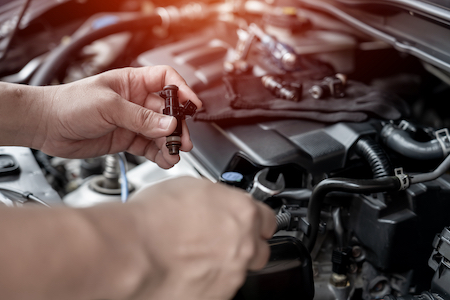According to Wikipedia, a sensor is a device that produces an output signal for the purpose of sensing a physical phenomenon. It’s a device, module, machine, or subsystem that detects events or changes in its environment and sends the information to other electronic devices. This is frequently a computer processor.
Today’s vehicles are made from over 10,000 parts. Because cars utilize technology for just about every system, they rely heavily on various sensors to ensure it’s operating efficiently. With over 70 sensors throughout the entire vehicle, they are used to control every aspect of performance.
What is a speed sensor?
One of the most common sensors is the speed sensor. Also known as the vehicle speed sensor (VSS), transmission speed sensor, or output shaft speed sensor, this small device determines how fast your vehicle is traveling by measuring the rotation of a wheel located inside the transmission. It produces a low voltage signal that is relayed back into the computer system known as the control module.
The speed sensor is critical in ensuring that your speedometer, cruise control, and transmission all work in unison. If you’re operating your vehicle with a bad speed sensor, you may not know how fast you’re going. That can compromise your safety, your passengers, and those around you.
Speed sensors also impact other systems on your vehicle. They track your travel distance, providing the odometer with an elapsed mileage reading. They are also connected with the handling and stabilizing technologies, so they can help your anti-lock brake system function correctly.

Can I drive my car with a bad speed sensor?
A bad speed sensor won’t bring your car to a halt. But what it will do is prevent you from driving safely down the road. Therefore, it’s important to ensure your speed sensor is working correctly without any problems impeding your journey.
How do you know if you have a bad speed sensor? Luckily, there are a few warning signs to alert you of a problem.
Speedometer problems
This is where many drivers first notice a sensor problem. As you’re driving and look down, you may notice inconsistent or erratic speedometer readings. You may see no reading at all.
Your car won’t stop working. However, you won’t be able to determine how fast you’re going. It will be guesswork at best. If you notice the speedometer acting odd, it’s time to bring your vehicle in for an inspection.
Cruise control problems
In most cases, the cruise control system depends on input from the vehicle speed sensor to operate. If you have a faulty speed sensor, it won’t connect with the cruise control, and you won’t be able to use it.
That’s because the powertrain control module is designed to automatically disable the cruise control when it fails to properly connect with the speed sensor. It does this because it would be impossible to maintain a constant speed without the interaction. It’s a safety feature designed for your protection.
If you notice a problem with your cruise control, have a mechanic check it over to see if you have a sensor problem.
Transmission problems
The vehicle speed sensor is used by the transmission control module to determine shift timing. If the speed sensor isn’t working correctly, it has a direct impact on how well the automatic transmission operates.
One of the most common signs of a bad speed sensor is an issue with the automatic transmission. You may notice symptoms such as a delay in shifting, hard shifts, or trouble with gear operation.
Because this has a direct impact on the safety of your vehicle, it’s imperative to bring your vehicle in immediately if you start having trouble.
Check engine light
The check engine light is one of the most common lights you’ll see displayed on your dashboard. That’s because it’s triggered by a variety of issues impacting your transmission and engine.
If it’s a bad speed sensor, it will trigger the check engine light warning you of a potential problem. In addition, you might also see the ABS light due to an issue between the connections of the sensor and the anti-lock brake system.
As with any light appearing on your dashboard, when one illuminates, schedule a maintenance visit with a mechanic.
How do you fix a speed sensor malfunction?
Some parts have specific replacement schedules. You know your motor oil needs to be changed every 3,000 miles or so.
But speed sensors don’t come with specific guidelines for maintenance and replacement. Speed sensors can wear down based on various things. If you drive in extreme weather conditions, ice, snow, road salt, and other chemicals can wear down the sensor faster than in more temperate conditions.
Speed sensors can also malfunction if:
- The speed sensor was installed incorrectly
- There’s an electrical fault in the speed sensor wiring
- The speed sensor and the electronic control unit are disconnected
- You have a defective speed sensor
- You don’t properly maintain your car
Like other maintenance items, you’ll find plenty of guidance online on how to replace a bad sensor yourself. But if you don’t have the proper knowledge, it can impact the way your vehicle operates. That’s why it’s usually best if you rely on a mechanic to replace a bad speed sensor and ensure your vehicle is operating at its best.
If you observe any of the symptoms from above, or notice your vehicle isn’t operating as it should, bring it in for a full inspection to determine where the problem begins. This ensures your car continues to drive safely out on the open road, and prevents larger maintenance items to the transmission or engine in the future. A faulty speed sensor can impact both transmission and the engine; without proper maintenance, it will impact future issues with the performance of your car.
